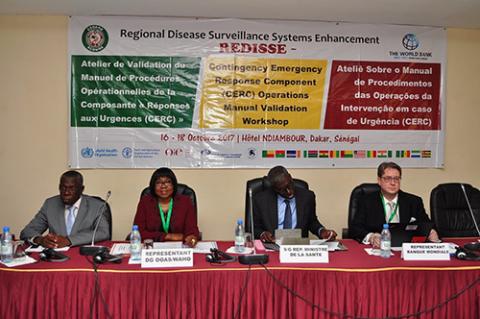
Date: 2017-10-17 10:33:31 ID: 1732
Dakar, 16 October 2017 – The deliberations to validate the “CERC Emergency Response” component of the Operational Procedures Manual started in Dakar (Senegal) this Monday 16 October 2017, in the presence of representatives of the Ministries of health of ECOWAS countries and Mauritania, several technical and financial partners such as the World Bank, the World Health Organisation (WHO), the International Organisation for Animal Health (OIE) and the West Africa Health Organisation (WAHO).
This meeting, organised by WAHO, aims at building the capacity of countries involved in phases I, II and III of the REDISSE project, and in the management of emergency procedures through the Contingent Emergency Response Component (CERC).
More specifically, it will involve (1) sharing to Contingent Emergency Response Component (CERC) of the standard procedures manual of the REDISSE project; (2) ensure qualification of applications to CERC for the purpose of responding to health emergencies; (3) obtain the opinion and contributions of countries for the identification of goods, services and relevant activities for health emergencies in order to consolidate the list of positive issues in the CERC manual; (4) ensure that countries are familiar with the activation of the CERC, the implementation process and the implications of activating the CERC; and (5) provide technical assistance and formulate recommendations to accelerate the operationalisation of the CERC.
The Chief Director of the Ministry of health and social welfare of Senegal, representing the Minister, presided over the opening ceremony in the presence of the representative of the Minister of health and social welfare of Togo, Chairperson of the ECOWAS Assembly of Health Ministers; the Head of the World Bank project and the representative of the Director General WAHO. In his speech, the representative of the Minister of health and social welfare of Togo, serving as the Chairman of the ECOWAS Assembly of Health Ministers, commended the holding of the meeting, which according to him “offers an opportunity to revisit the strategies aiming at strengthening the disease and surveillance systems in ECOWAS countries and in Mauritania”.
In his speech, the Head of the World Bank project, Dr John Paul Clark, recalled the objectives of the REDISSE project, the importance of the CERC in providing rapid and efficient responses to emergencies. He commended the participation of Mauritania in the REDISSE project together with ECOWAS countries. On her part, the representative of the Director General of WAHO, Dr Félicité Chokki, thanked Senegal for accepting to host the meeting. She thanked the countries for honouring the meeting with their presence. She outlined the principal regional and coordination activities implemented by WAHO since the launch of the REDISSE project in November 2016. She exhorted countries to accelerate the implementation of the REDISSE project and invited the other countries of Phase III to start preparations for the project with a view to actually starting the project activities.
In his speech, the Chief Director of the Ministry of health and social welfare of Senegal, representing the Minister, who was unavailable, thanked the World Bank and WAHO for choosing Dakar as the venue of the meeting. He underscored the relevance of the issues that will be discussed during the meeting and which will contribute to strengthening the disease surveillance and response systems and will also consolidate the resilience capacity of countries confronted with health emergencies. He thanked partners for the various forms of support they continue to provide to ECOWAS countries and to Mauritania. After wishing the meeting success, he opened the deliberations of the workshop, on behalf of the Minister of health and social welfare of Senegal.
The recent Ebola virus disease, which broke out in West Africa, reaffirmed the imperative necessity to strengthen national disease and surveillance systems as well as collaboration among countries with a view to early detection of epidemics and rapid efficient response in order to minimise losses of human life and costs. The World Bank, through the Regional Disease Surveillance Systems Enhancement (REDISSE) project, supports countries to enable them deal with possible epidemics and health emergencies, while WAHO is responsible for regional coordination.
